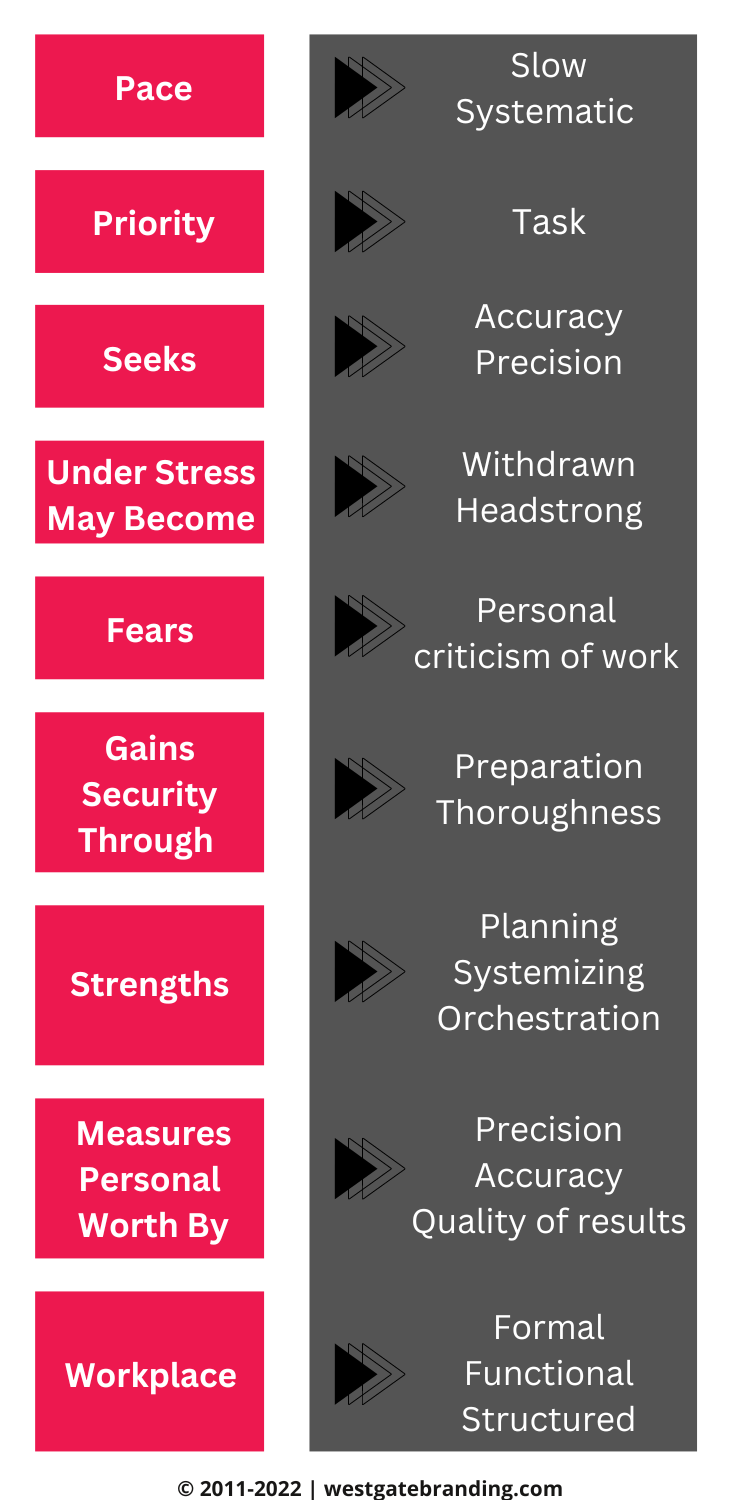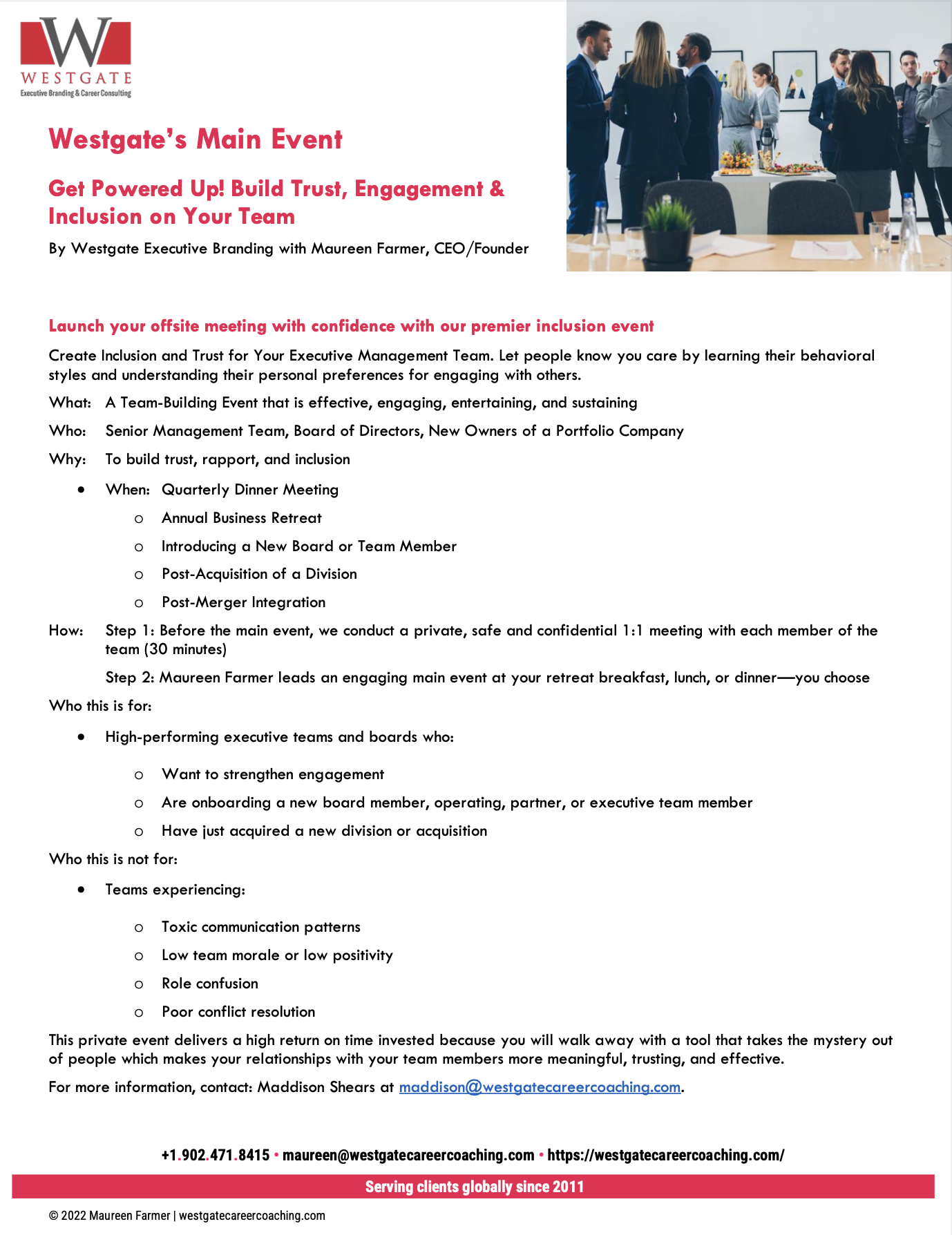Driving peak performance for CEOs and their boards, Westgate Executive Branding Offers Premier Advisory Services & Personal Branding Consulting for High-Profile Leaders. About Maureen—CEO & Founder.

Working with an analytical CEO has its challenges because they’re often direct and guarded. They can hesitate to trust new or unfamiliar people until they have established their credibility. They respond best to facts, data, and evidence cited from credible and respected sources. They prefer order over chaos and strive for perfection, which can sometimes be perceived as a bottleneck to processes (especially with tight deadlines). That said, their dedication to quality and extreme attention to detail is highly valued. Finding the balance of working with an analytical leader through effective communication is key.
Understanding leadership and communication styles help organizations to avoid costly terminations and enhance the performance of CEOs. Learning how to approach the board with confidence or how to approach your operating partner with a key issue is crucial. CEO turnover and its cost to investors, reputational damage to the brand, and friction with employees are all risks associated with poor communication.
Research by The Economist Intelligence Unit, Communication barriers in the modern workplace (2018), shows how poor workplace communication can destabilize a company’s performance with: 52% more stress for employees, 44% failure to complete a project, 31% low employee morale, and 25% missed performance goals.
In addition to this tool supporting team building and behavioral analysis, it also supports our proven system (C-Suite Optimization Program) that puts key messaging and authentic personal branding into the hands of the executive. The personal brand is a tool and corporate asset to help the CEO navigate the tricky and sometimes sticky relationships in the corner office.
Executive personal branding helps to uncover authentic messaging based on personal values using verifiable tools. Personal branding strengthens communications with internal and external audiences in a way that supports the corporation’s brand and its business goals.
This article is an extension of a very popular one we wrote discussing how to work with teams. This is the final article of 4 that we have published over the last 2 months on the four primary leadership styles.
You might be interested in viewing the first three we published—the “type A” leader, the extroverted leader, and the soft, introverted leader.

Executive performance optimization
At a recent business meeting in New York City, a private-equity executive (after listening to my value proposition) asked me: “Maureen, how do I get someone like you into my portfolio company? I know they need you, but how do we bring you into the company without accusing the CEO (or the board) of incompetence?”
It’s a great question, which we address in this article.
When to bring Westgate into your organization
Typically, we’re invited into organizations when:
There is a newly appointed CEO
- To protect the board’s investment in the new CEO
- To assist with an effective CEO transition with the new leadership team
- To align internal and external messaging designed to improve CEO/Board engagement
When change is coming
- Handing over the reins to a new leader
- An IPO or strategic sale is on the horizon
- Require a plan for the business post-bankruptcy
When change is overdue
- Optimize the digital footprint for the CEO and leadership team
- Raise thought leadership and visibility in the capital markets
- Align the CEO and the board’s priorities
Organizations are led by various types of leaders: high drivers, extroverts, introverts, and analytical leaders. This article focuses on how to interact with and influence the analytical CEO, Board Chair, shareholder or investor.

How to work with the analytical CEO
When dealing with a highly analytical CEO, Board Chair, shareholder or investor, understand the business and situation from their perspective.
How do you know the person you’re dealing with (CEO, board chair, etc.) is highly analytical?
- Acts upon attention to detail, facts, data, and logic rather than emotion
- Tend to lead by setting an example themselves, versus delegation
- Strive for perfection and the highest quality—disappointed with “pretty good”
- Take calculated, educated risks only after thoughtful analysis of facts and data
- Tend to practice incredible patience but can have difficulty meeting deadlines if perfection isn’t accomplished
The following infographic demonstrates their outward preferences and behaviors:

How to work with the analytical executive
When communicating with analytical executives, ask your questions in a discreet, non-judgemental manner to elicit the points, objectives, or assurances:
“Steve, I’m not trying to pressure you, but I’m really curious about why you think this may or may not work.”
The ideal work environment for these executives provides freedom from intensely pressured decisions. They appreciate time to reflect and think about pros and cons to solutions. They generally prefer a work group which provides close relationships with a small group of associates, rather than superficial relationships with a larger group of people.
They like to work in an environment that offers standard, accepted operating procedures that support complex processes. To that end, they prefer encouragement to make decisions by logic, rather than emotion.
These executives welcome complete explanations of areas of responsibility and control—avoiding vagueness at all costs.
How to handle conflict with an analytical CEO (real or perceived) …
If you find yourself experiencing a dispute with an analytical executive, be straightforward in a direct and factual way. Prepare your case in advance, don’t try to “wing it,” using charm or heavy emotion. Be certain that the information you use in a persuasive conversation is credible. You want to avoid pushing too hard or rushing the issue and never rely on vagueness or someone else’s opinion.
Under stress, these leaders can be resistant to change, slow to begin work, unimaginative, resentful, and withdrawn. To help them during these times, they need accuracy, a safe, slow pace for “processing” information, and time to understand the principles and details.
Strategies for these leaders to help reduce long-term conflict involve their ability to stand up for themselves versus avoiding a difficult conversation or pretending to go along with them. Ideally, they have a work environment where they are safe to share the reasoning behind their decisions. Remind them that others who are more comfortable dealing with conflict and/or anger may appear as a personal attack but is in fact a different communication style all together.

How to help the analytical CEO decide…
First, confirm they are open to discussing the problem or decision. If they aren’t ready, either set a definite time that’s better for both of you and/or explore their concern in even pursuing the subject. Be sure to give them the time and space to think—they will not appreciate being rushed.
When a situation is being explored, review your impression of the process with them:
“Alice, my understanding is you’d like to think it over and figure out what time commitment you’d be able to make to the group. When may I call you about your decision?”
How to encourage the analytical CEO…
Highly analytical leaders value accuracy and logic. Appeal to their need of these. Keep your approach clear, clean, and procedural. If possible, provide illustration and documentation. Avoid exaggeration and vagueness while proving to them the best available options.
Draw them out by asking, “How would you…?”
If appropriate, show them how to get a job done and let them master and modify it to suit their needs.

How to compliment the analytical CEO…
It’s important to mention their efficiency, thought processes, organization, persistence and accuracy. Try not to mix personal and professional comments. Typically, compliments don’t mean much, unless it deals with how well they did on the task. Avoid over-embellishing—keep it simple and concise.
In acknowledging their efforts, focus on your realization of how difficult it can be for them to attempt to meet the high personal standards they set for themselves—better yet, be able to cite specific and appropriate examples which prove this point.
Know their fears
Analytical executives generally fear personal criticism of their work efforts. You can help to reduce these fears by allowing them to develop a plan for change so they can identify and bring under control any key considerations that have to be addressed.
When possible, allow them to investigate possible repercussions, especially at the beginning stages; they will be more comfortable with changes. Allow them to save face, as they fear being wrong.
“Edward, your work here is typically done neatly and on time. This new software will help you turn out the same quality of work, just faster.”

How you can introduce us to your firm’s leadership:
Launch your offsite meeting confidently with our premier inclusion event.
Create inclusion and trust for your executive management team. Let people know you care by learning their behavioral styles and understanding their personal preferences for engaging with others.
This private event delivers a high return on time invested because you will walk away with a tool that takes the mystery out of people, making your relationships with your team members more meaningful, trusting, and effective.
The Main Event begins with a 1:1 conversation with the CEO and their team, followed by a group debrief that lasts approximately 40 minutes. It’s fun, safe, and provides strategies your CEO and team can begin using immediately.
For more information, contact: Maddison Shears at maddison@westgatecareercoaching.com.
Instant download below (Main Event Brochure)

Maureen Farmer, CEO/Founder, is a Certified Personal Branding Strategist. She helps CEOs build authority, trust and elevate their credibility with capital markets, shareholders, investors, employees, and clients.

